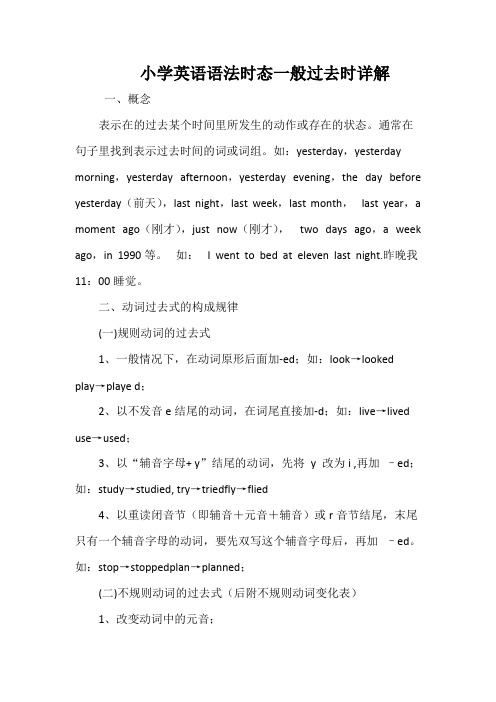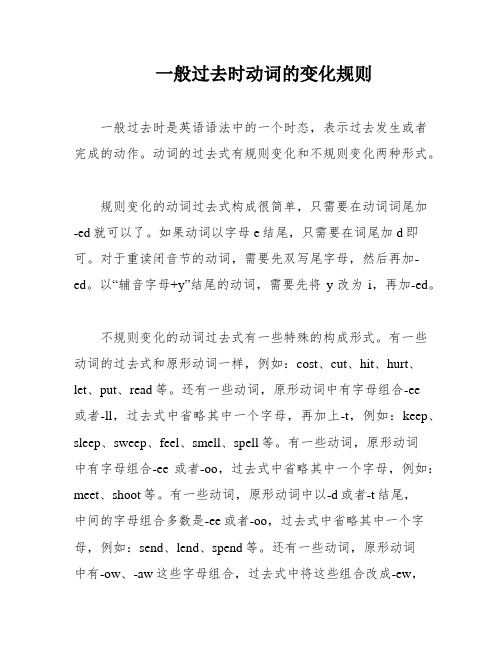小学一般过去时及动词过去式变化规则及不规则形式
一般过去时的规则动词与不规则动词

四种用法①表示在过去某个时间发生的动作或情况。
例如:I went to school at 7:00 yesterday morning.我昨天早晨七点去上学。
②表示在过去某个时间存在的状态。
例如:She was not at home last night.她昨晚八点没在家。
③表示在过去经常或反复发生的动作,常和often(经常)、always(总是)、sometimes(有时)等表示频率的时间状语连用。
例如:He often had lunch at school last month.他上个月经常在学校吃午饭。
④表示已故的人所做的事情或情况。
例如:Ba Jin wrote a lot of novels for us.巴金写了很多部小说。
四种时间状语①yesterday及相关短语。
例如:yesterday morning/afternoon/evening 昨天上午/下午/晚上。
②“last+ 时间状语”构成的短语。
例如:last night/month/spring/year 昨晚/上个月/去年春天/去年。
③“一段时间+ago”组成的短语。
例如:three days ago 三天以前 four years ago四年以前。
④“介词+ 时间名词”组成的短语。
例如:in 1999 在1999年;on the morning of December 25th 在12月25号早上。
四种谓语动词的表现形式① be动词的过去式was、were.例如:She was a teacher five years ago. 她五年前是一名教师。
②行为动词的过去式,分为规则动词和不规则动词两种。
规则动词的过去式的构成遵循以下四个规则:1)直接在动词后加ed,例如:help-helped; want-wanted等; 2)以不发音的字母e结尾时,去掉e加ed (即直接加d) , 例如:like-liked; use-used等;3)以辅音字母y结尾时,把y变成i再加ed, 例如:carry-carried; study-studied等;4)以重读闭音节结尾,双写最后一个辅音字母再加ed, 例如:stop-stopped; shop-shopped等。
一般过去时专项练习及动词过去式变化规则

一般过去时专项练习及动词过去式变化规则动词过去式变化规则一、规则变化1、一般情况下,动词词尾加-ed,,如:work—worked play—played want—wanted ask—asked2、以不发音的-e结尾动词,动词词尾加-d,如:live—lived move—moved taste—tasted3、以“辅音字母+y”结尾的动词,把y改成I,加—ed, 如:study—studies try—tried copy—copied carry—carried4、重读闭音节动词,以“辅元辅”结尾,双写词尾辅音字母,再加—ed, 如:stop—stopped二、不规则变化Is /am—was are—were do—did have/ has—had go—went meet—met come—came take—took steal—stole eat—ate fly—flew run—ran see—saw say—said make—made find—found stand—stood sit—sat sing—sang drink—drank give—gave ring—rang swim—swam write—wrote ride—rode drive—drove draw—drew grow—grew know—knew get—got forget—forgot sweep—swept keep—kept sleep—slept speak—spoke break—broke tell—told sell—sold buy—bought think—thought catch—caught teach—taught build—built can—could shall—should will—would过去式与动词原形一样:let—let must—must put—put read—read三、动词过去式构成读音1、清辅音后读清辅音[t] (清读清)如:jump like2、浊辅音后读浊辅音[d] (浊读浊)如:listen pull3、元音后面读浊辅音[d] (元音后面读浊音)如:water play4、[t][d]后面读[id] want need一般过去时专项练习一、写出下列动词的过去式1.am/is ______2.do _______3.go ________4.have _______5.isn’t _________6. ar en’t ________7.spend________8.cook_______9.read________10.clean_______ 11.live _______ 12.study_________三、用括号内所给词的适当形式填空1. We _________ (enjoy) ourselves at the party last night.2.Jack ____________ (study) for the English test last Sunday.3._______ you ______ (go) to the Great Wall last year?4. What day _______ (be) it yesterday?5.The old man _______(be)ill and went to see a doctor.6.We ________ (have) a party last night.7.We __________ (visit) the museum and went home.8.— How _______ (be) the students? — They were very friendly.9.He often _______ (have) supper at home. Today he ______ (have) supper at school.10.— ______ he _______ (have) lunch at nine? —No, he didn’t.11.They _________(buy) a guitar yesterday.五、选择填空( ) 1. Lee ____ his mobile phone at home. A. leave B. leaves C. leaved D. left( ) 2. ___ he ___a good rest? No, he didn’t. A. Do, had B. Did, have C. Did, had D. Was, had ( ) 3. As soon as he __, he _ to his family.A. arrived, writesB. arrived, writtenC. arrived, wroteD. arriveds, write( ) 4. Mr. Black was late because he _______ his way. A. losted B. lose C. loses D. lost ( ) 5. When _________ Lee ________ school this morning?A. did, got toB. did, get toC. did, getD. did, got( ) 6. Will you please say it again? I _ quite __you.A. didn’t, hearB. don’t, heardC. didn’t, heardD. don’t, hear( ) 7. _you __at six o’clock yesterday? A. Do ,ge t up B. Did, get up C. Do, got up D. Did, got up ( ) 8.What did you see ____? A. now B. every day C. these days D. just now( ) 9.He went into the room and ____ the door. A. lock B. locking C. locks D. locked ( ) 10. What __ you __last week? I bought a bag.A. did ,buy B. did , bought C. do, buy D. do, bought ( ) 11. —__he __his lunch? — Yes, he did. A. Does ,has B. Does, have C. Did, have D. Did, had ( )12.—Did the thieves _____ into the car? —No, they______.A. fell, didn’tB. fall(落下), didC. jump(跳), didn’tD. jump, did( ) 13. -When did May come back from Hong Kong? -She __ from Hong Kong last Friday.A. come backB. comes backC. returned backD. came back( ) 14. ____ she _____ this dictionary in the bookshop nearby last week?A. Did, buyB. Does, buyC. Did, boughtD. Does, buys( ) 15. He ____ to the station this morning and was______ for the train.A. hurry, in timeB. hurries, on timeC. hurried, in timeD. hurried, at time( ) 16. Where _____ Uncle Sun yesterday? A. was B. were C. did D. does( ) 17. —Have you seen him today? —Yes, I ____ him this morning.A. seeingB. seeC. seesD. saw( ) 18. He ____worried when he heard the news. A. is B. was C. does D. did( ) 19. There ___ a telephone call for my brother Steven yesterday? A. is B. are C. was D. were ( ) 20. Liu Fengwei _____ three yuan for the lost library book.A. paidB. payC. spentD. lost( ) 21. He __ in this school in 1958. A. taught B. teach C. teaches D. teaching( ) 22. They __ tired so they stopped __a rest.A. are, haveB. were, haveC. were, to haveD. are, having( ) 23. Yesterday I _____ in bed all day because I had a fever. A. lay B. lie C. laid D. lied ( ) 24. It was raining hard when he ____ home. A. got B. get C. gets D. was getting( ) 25. She said her brother ____ in Beijing. He ______ to Japan on business last week.A. wasn’t, wentB. hasn’t, wentC. wasn’t, goD. isn’t, went七、用所给动词的适当形式填空1.Tom and Mary ___________ (come) to China last month.2.Mary __________ (read) English yesterday morning.3.There _________ (be) no one here a moment ago.4.I ___________ (call) Mike this morning.5.I listened but ___________ (hear) nothing.6.Tom ___________ (begin) to learn Chinese last year.st week we _________ (pick) many apples on the farm.8.My mother ________________ (not do) housework yesterday.9.She watches TV every evening. But she _______________ (not watch) TV last night.10.________ your father ________ ( go ) to work every day last year?st year the teacher ___________ (tell) us that the earth moves around the sun.12.There ____________ a telephone call for you just now. (be)13.There __________ not enough people to pick apples that day. ( be)14.There _____________ any hospitals (医院) in my hometown (家乡) in 1940. ( be not)15.There ____________ enough milk at home last week, wasn’t there?16.Eli ____________ to Japan last week. ( move)17. –When _______ you _________ (come) to China? - Last year.18.Did she ________ (have) supper at home?19.Jack ____________ (not clean) the room just now.20._________ (be) it cold in your city yesterday?21.How many people ________ (be) there in your class last term?22.It ________ (be) hot yesterday and most children _______ (be) outside.23. There ________ (be) a football match on TV yesterday evening, but I _________ (have) no time to watch it.24. He ate some bread and _________ (drink) some milk.25. ________ he __________ (finish) his homework last night?26. I__________(be) tired yesterday.27. What _________ you ___________ (do) last night?28. My grandfather _________ (leave) Hong Kong for New York in 1998.29. What _______ he ________ (do) yesterday?30. Last week I _______ (buy) a new bike.31. He ________ (be) here just now.32. He __________ (not find ) his key last night.33. My father __________ (drink) a lot of wine yesterday.。
(完整)小学英语语法时态一般过去时详解

小学英语语法时态一般过去时详解一、概念表示在的过去某个时间里所发生的动作或存在的状态。
通常在句子里找到表示过去时间的词或词组。
如:yesterday,yesterday morning,yesterday afternoon,yesterday evening,the day before yesterday(前天),last night,last week,last month,last year,a moment ago(刚才),just now(刚才),two days ago,a week ago,in 1990等。
如:I went to bed at eleven last night.昨晚我11:00睡觉。
二、动词过去式的构成规律(一)规则动词的过去式1、一般情况下,在动词原形后面加-ed;如:look→looked play→playe d;2、以不发音e结尾的动词,在词尾直接加-d;如:live→lived use→used;3、以“辅音字母+ y”结尾的动词,先将y 改为i ,再加–ed;如:study→studied, try→triedfly→flied4、以重读闭音节(即辅音+元音+辅音)或r音节结尾,末尾只有一个辅音字母的动词,要先双写这个辅音字母后,再加–ed。
如:stop→stoppedplan→planned;(二)不规则动词的过去式(后附不规则动词变化表)1、改变动词中的元音;begin→began drink→drank come→came eat→ate grow→grew run→ran know→knew win→wonspeak→spoketake→took write→wrote get→got2、变词尾的–d 为–t ;build→built lend→lent send→sent spend→spent bend→bent3、与动词原形一样;cut→cut put→put cost→cost hurt→hurt shut→shut4、变-ay 为-aid (少数动词);say→said pay→paid lay→laid5、采用不同词根;sell→sold teach→taught buy→bought6、其他。
小学六年级重要知识归纳常见动词的过去式变化规则

小学六年级重要知识归纳常见动词的过去式变化规则一、动词的过去式变化规则动词的过去式表示过去发生、进行或存在的动作或状态。
在学习动词的过去式时,我们需要了解一些常见的变化规则。
1. 一般规则大多数动词在构成过去式时,直接在动词词尾加上-ed。
例如:- play → played- work → worked- dance → danced2. 以不发音的字母“e”结尾的动词对于以不发音的字母“e”结尾的动词,只需在词尾加上-d。
例如:- like → liked- escape → escaped- believe → believed3. 以重读闭音节且末尾只有一个辅音字母的动词对于以重读闭音节且末尾只有一个辅音字母的动词,需要双写这个辅音字母,再加上-ed。
例如:- stop → stopped- plan → planned- drop → dropped4. 以“辅音字母+y”结尾的动词对于以“辅音字母+y”结尾的动词,将“y”变成“i”,再加上-ed。
例如:- study → studied- try → tried- carry → carried5. 特殊变化规则有一些动词的变化规则比较特殊,需要特别注意。
例如:- be → was (过去式变化不规则,第三人称过去式为were)- have → had- do → did- go → went二、常见动词的过去式变化下面是一些在小学六年级中常见的动词及其过去式变化:1. 动词:be(是,存在)过去式:was / were2. 动词:have(有)过去式:had3. 动词:do(做)过去式:did4. 动词:go(去)过去式:went5. 动词:see(看见)过去式:saw6. 动词:get(得到)过去式:got7. 动词:come(来)过去式:came8. 动词:eat(吃)过去式:ate9. 动词:drink(喝)过去式:drank 10. 动词:read(读)过去式:read(同形)11. 动词:write(写)过去式:wrote12. 动词:take(拿,取)过去式:took13. 动词:find(找到)过去式:found14. 动词:give(给予)过去式:gave15. 动词:say(说)过去式:said总结:动词的过去式变化规则多种多样,但掌握常见的规则和不规则变化可以帮助我们正确地使用过去式。
一般过去时及动词的过去式变化规则

一般过去时及动词的过去式变化规则一般过去时1)、表示过去发生的动作或出现的状态,用动词的过去式来表达,如:I was at the library yesterday afternoon.Tom studied hard and did well in the final exam last year.2)、动词的过去式分为规则动词和不规则动词两种:规则动词的过去式:①一般情况下在动词原形后直接加-ed。
wanted,played②以不发音的字母e结尾的动词,直接加-d。
hoped,lived③重读闭音节单词如果末尾只有一个辅音字母需双写最后一个辅音字母,再加-ed stopped④以辅音字母+y结尾的动词变y为i,再加-ed。
studied,worried以元音字母+y结尾的动词,直接加-ed. played, enjoyed规则动词过去式的读音也有规律可循。
请记住:清后[t],元浊[d],[t] [d]之后读[id]。
①清辅音后,ed要读[t]。
worked,finished②元音或浊辅音后,ed要读[d]。
lived,called③[t]或[d]后,ed读[id]。
started,needed不规则动词有其自己的变化形式,只能分别记忆。
1. go -went2.take-took3. have-had4.buy-bought5. eat-ate6.see-saw7. hang-hung(悬挂)8.meet-met9. win-won(赢得) 10.sleep-slept 11. put-put e-came13. wake-woke(醒)14.read-read 15let-let (详见课本《不规则动词表》)3)句式及其变化:a. be动词过去式的句式:否定句是在was/were后面加not,was not (wasn't)/were not (weren't)。
一般疑问句是把was / were提前并放到句首,要求首字母要大写b. 实义动词过去式的句式:①肯定式:主语+动词过去式+其它。
一般过去时动词的变化规则

一般过去时动词的变化规则一般过去时是英语语法中的一个时态,表示过去发生或者完成的动作。
动词的过去式有规则变化和不规则变化两种形式。
规则变化的动词过去式构成很简单,只需要在动词词尾加-ed就可以了。
如果动词以字母e结尾,只需要在词尾加d即可。
对于重读闭音节的动词,需要先双写尾字母,然后再加-ed。
以“辅音字母+y”结尾的动词,需要先将y改为i,再加-ed。
不规则变化的动词过去式有一些特殊的构成形式。
有一些动词的过去式和原形动词一样,例如:cost、cut、hit、hurt、let、put、read等。
还有一些动词,原形动词中有字母组合-ee或者-ll,过去式中省略其中一个字母,再加上-t,例如:keep、sleep、sweep、feel、smell、spell等。
有一些动词,原形动词中有字母组合-ee或者-oo,过去式中省略其中一个字母,例如:meet、shoot等。
有一些动词,原形动词中以-d或者-t结尾,中间的字母组合多数是-ee或者-oo,过去式中省略其中一个字母,例如:send、lend、spend等。
还有一些动词,原形动词中有-ow、-aw这些字母组合,过去式中将这些组合改成-ew,例如:blow、grow、know、throw、draw等。
动词原形中有字母组合-in(m)或者-ing或者-ink,过去式中将字母-i变成-a,例如:begin、sing、ring、drink、swim等。
以-m、-n结尾的不规则动词,过去式在原形动词词尾加-t或者-d,例如:mean、learn、dream、hear等。
过去式有-ought、-aught的动词,例如:think、buy、bring、teach、catch等。
动词原形是以元音字母-i加辅音字母加不发音的-e结尾的,一般是在过去式中将字母i改成-o,例如:ride、write、drive等。
动词原形中有-ea、-ee或者-oo的字母组合的不规则动词,动词过去式是将这个字母组合改成-o,然后在词尾加-e,例如:break、speak、choose 等。
(完整版)动词过去式变化规则大全

(完整版)动词过去式变化规则大全一、规则动词(Regullar Verbs) 的过去式由“动词原形+-ed”构成,具体变化有:1. 一般的直接在词尾加-ed。
如: want—wanted, work—worked, need—needed, clean—cleaned2. 以不发音的e结尾的在词尾加-d。
如:like—liked, live—lived, use—used, move—moved smile--smiled; hope--hoped.注意:ie结尾动词,直接加d: died;tied.3. 以一个元音字母加一个辅音字母结尾的重读闭音节动词,先双写结尾的辅音字母,再加-ed。
如:stop—stopped, trip—tripped planned;4. 以辅音字母加y结尾的动词,先把y变成i,再加-ed。
如:study—studied, carry—carried, hurry—hurried, marry—married worried; studied.注意:规则动词过去式加“ed”后的发音规则:在浊辅音和元音后面[d]called [k?:ld] borrowed[b?r??d] moved[mu:vd]在清辅音后面[t] helped[helpt] passed[pa:st]在[t] [d]音后面[id] started['sta:tid] counted['kauntid]needed['ni:did] counted['kauntid]补充说明:二、不规则动词(Irregular Verbs)的过去式大体上归纳有以下记忆法:1. 以t结尾的词,过去式与原形相同。
如:put—put, let—let, cut—cut, beat—beat read—read must--must2. 以d结尾的词,把d变成t。
如:build—built, lend—lent, send—sent, spend—spent3. 以n结尾的词,在词后加t。
一般过去时及动词的过去式变化规则

一般过去时及动词的过去式变化规则一般过去时1)、表示过去发生的动作或出现的状态,用动词的过去式来表达,如:I was at the library yesterday afternoon.Tom studied hard and did well in the final exam last year.2)、动词的过去式分为规则动词和不规则动词两种:规则动词的过去式:①一般情况下在动词原形后直接加-ed。
wanted,played②以不发音的字母e结尾的动词,直接加-d。
hoped,lived③重读闭音节单词如果末尾只有一个辅音字母需双写最后一个辅音字母,再加-ed stopped④以辅音字母+y结尾的动词变y为i,再加-ed。
studied,worried以元音字母+y结尾的动词,直接加-ed. played, enjoyed规则动词过去式的读音也有规律可循。
请记住:清后[t],元浊[d],[t] [d]之后读[id]。
①清辅音后,ed要读[t]。
worked,finished②元音或浊辅音后,ed要读[d]。
lived,called③[t]或[d]后,ed读[id]。
started,needed不规则动词有其自己的变化形式,只能分别记忆。
1. go -went2.take-took3. have-had4.buy-bought5. eat-ate6.see-saw7. hang-hung(悬挂)8.meet-met9. win-won(赢得) 10.sleep-slept 11. put-put e-came13. wake-woke(醒)14.read-read 15let-let (详见课本《不规则动词表》)3)句式及其变化:a. be动词过去式的句式:否定句是在was/were后面加not,was not (wasn't)/were not (weren't)。
一般疑问句是把was / were提前并放到句首,要求首字母要大写b. 实义动词过去式的句式:①肯定式:主语+动词过去式+其它。
- 1、下载文档前请自行甄别文档内容的完整性,平台不提供额外的编辑、内容补充、找答案等附加服务。
- 2、"仅部分预览"的文档,不可在线预览部分如存在完整性等问题,可反馈申请退款(可完整预览的文档不适用该条件!)。
- 3、如文档侵犯您的权益,请联系客服反馈,我们会尽快为您处理(人工客服工作时间:9:00-18:30)。
一般过去时及动词过去式变化规则一般过去时:表示过去发生的动作或存在的状态。
结构:谓语动词为动词的过去式。
经常跟表示过去的时间连用:yesterday, last night /last year / last month/ last month
比如:I went home yesterday.
I played football last Sunday.
肯定句:I went home yesterday.
否定句:I didn't go home yesterday. (did not = didn't)
一般疑问句:Did you go home yesterday?
特殊疑问句:Where did you go yesterday?
肯定句:I was at home last night.
否定句:I wasn't at home last night. (was not = wasn't)
一般疑问句:Were you at home last night?
特殊疑问句:Where were you at home last night?
动词过去式变化规则
1. 一般情况下直接加-ed, work--worked
walk-- walked help--helped play--played
2. 以不发音的字母e结尾的动词,加d, dance--danced like-liked
3. 以重读闭音节结尾,而且结尾只有一个辅音字母,双写这个辅音字母,再加ed, plan--planned, stop--stopped, shop--shopped
4. 以辅音字母加y结尾的动词,把y变成i,再加ed, try-- tried, study--studied
5. 不规则动词的变化:
take--took, have--had, see--saw, draw--drew, come--came, give--gave, sit--sat, sing--sang, swim--swam, drink--drank, run--ran, put --put read--read, buy--bought, am/is--was are--were , do --did, go --went, make---made。
